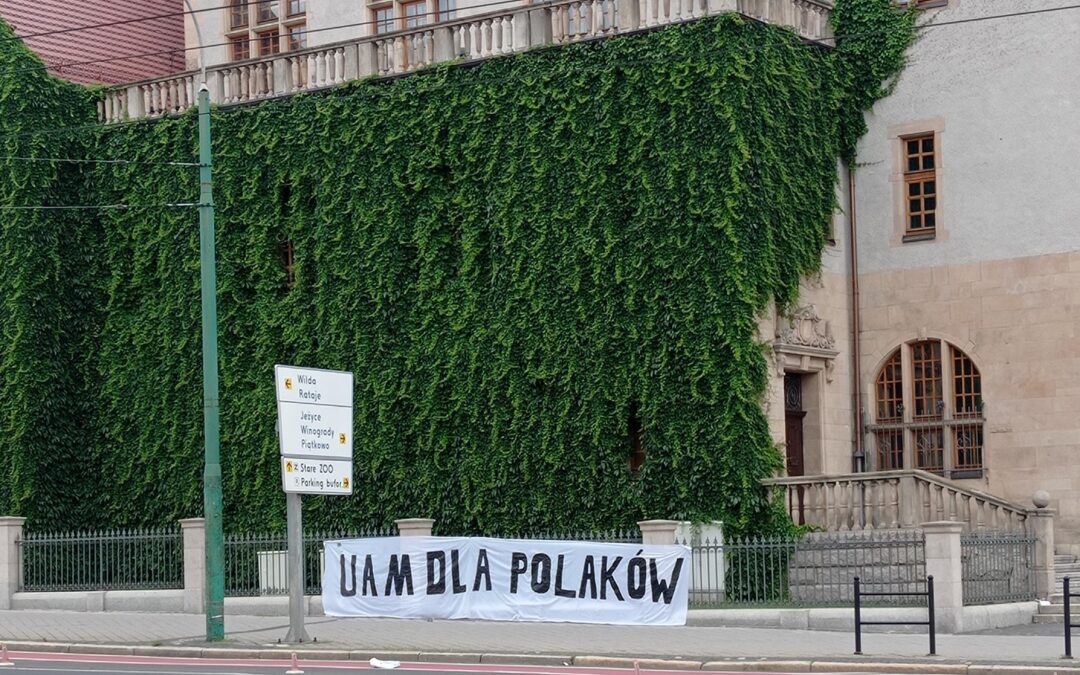Polish nationalists have criticised one of the country’s leading universities for admitting a large number of foreign students in its intake for the new academic year. One group hung a sign outside saying that the university should be “for Poles”.
This week, it emerged that large numbers of applicants from Poland’s eastern neighbours, in particular Ukraine and Belarus, were listed among the highest ranked candidates to study various subjects at Adam Mickiewicz University (UAM) in Poznań.
Such students made up 80% of the top 50 candidates for international relations, notes Dziennik Gazeta Prawna. They also featured prominently on rankings for computer science, management and psychology, among other subjects (though the university notes that these are rankings of candidates’ applications, not yet admission lists).
The issue was first highlighted by Ziemowit Przebitkowski, the leader of All-Polish Youth (Młodzież Wszechpolska), one of Poland’s foremost far-right groups. On Facebook, he shared a screenshot of the highest-rated 15 students applying for one course, nearly all of whom had non-Polish names.
“The ‘right-wing’ PiS government rewards foreigners at universities paid for by the Polish taxpayer,” he wrote, referring to the national-conservative ruling Law and Justice (PiS) party. “We thank PiS for multikulti in Poland.”
Przebitkowski noted that a change made under PiS to the algorithm for deciding university funding gave greater weight to “internationalisation”. Dziennik Gazeta Prawna, a leading daily newspaper, notes that this helps them receive higher subsidies from the education ministry and do better in rankings.
Yesterday, All-Polish Youth’s branch in Poznań posted photos of a banner hanging outside the university saying “UAM for Poles”. They wrote that “the extremely high number of foreigners being admitted limits the possibilities for our compatriots, who often dreamed of studying at university”.
Later, the organisation said that it had “received information from all over Poland that the number of foreigners admitted compared to Polish students is extremely high”. It said that universities were treating Ukrainian and Belarusian school exam grades as equal to Polish ones, even though they are “at a different level”.
“How can you treat as equal two [sets of] exams completely different in content and organisation,” tweeted Krzysztof Bosak, an MP and former presidential candidate from the far-right Confederation (Konfederacja) party, who also criticised the government for giving scholarships to Belarusian students.
“[This is] how Poland is transformed into a multinational state and how immigrants are privileged,” added Bosak. “Unfortunately, we are repeating many of the mistakes of the west in immigration policy.”
"University is a place for everyone, we are all equal" says the rector of @USinKatowice in a new promotional video featuring students from Korea and Nigeria, one with disabilities and one who is gay.
Video in the link https://t.co/0fXRFi1LGC
— Daniel Tilles (@danieltilles1) September 14, 2020
Another criticism of UAM, which was last year ranked as one of Poland’s top five universities, came from Stanisław Żerko, a history professor at the Institute for Western Affairs, a research society also based in Poznań.
He claimed that UAM was treating Polish applicants as “second class” and favouring foreign students in order to “get more money”.
In response to the criticism, UAM’s rector, Bogumiła Kaniewska, issued a statement assuring that foreign applicants are not favoured over Polish ones, with both assessed by the same criteria. In 2020, out of UAM’s more than 35,000 students, only 1,226 were from abroad.
UAM: tu nie ma nic niewłaściwego.. Po pierwsze – chce zyskać lepsze miejsca w świat. rankingach, po drugie – dostaje więcej pieniędzy, bo wysokość subwencji ministerialnej zależy również od wskaźnika umiędzynarodowienia. Aha, niech tracą polscy maturzyści – kandydaci II kategorii https://t.co/FeqZq4zJB8
— Stanisław Żerko (@StZerko) July 20, 2021
In response to the criticism, UAM’s rector, Bogumiła Kaniewska, issued a statement assuring that foreign applicants are not favoured over Polish ones, with both assessed by the same criteria. In 2020, out of UAM more than 35,000 students, only 1,226 were from abroad.
Kaniewska confirmed, however, that “the increasing number of foreign students” was a result of “many years of efforts” aimed at a “further internationalisation” of the university.
“University traditions assume equal access to knowledge, openness and respect for diversity,” she wrote. “I shall make sure that UAM…is a university for all.”
The rector also condemned the appearance of the “UAM for Poles” banner. She said it “brought back memories” of efforts by nationalists in interwar Poland – including All-Polish Youth – to restrict the number of Jews at universities through what was known as a “numerus clausus” and to force Jewish students to sit on separate “ghetto benches”.
A spokeswoman for the university told Dziennik Gazeta Prawna that the legal basis for recognising Ukrainian qualifications is an agreement between the two countries’ governments. However, an education ministry spokeswoman noted that it is up to universities themselves to determine their entry criteria.
Mirosław Skórka, head of the Union of Ukrainians in Poland, told the newspaper that Ukraine’s high school exams have a similar form of evaluation to Poland’s. He argued that the desire of Ukrainians to study at Polish universities should be seen as a compliment, and will also provide Poland with an economic and demographic boost.
Poland’s education ministry notes that the country still has one of the lowest rates of “internationalisation” among OECD countries. Only 3% of students come from abroad (almost half of them from Ukraine), reports Dziennik Gazeta Prawna.
Overall, however, Poland has in recent years had one of the highest levels of immigration in the European Union. In each of the last three years it has issued more residence permits to non-EU citizens than any other member state. The vast majority of arrivals have come from Ukraine.
Main image credit: Młodzież Wszechpolska Poznań/Facebook

Daniel Tilles is editor-in-chief of Notes from Poland. He has written on Polish affairs for a wide range of publications, including Foreign Policy, POLITICO Europe, EUobserver and Dziennik Gazeta Prawna.




















